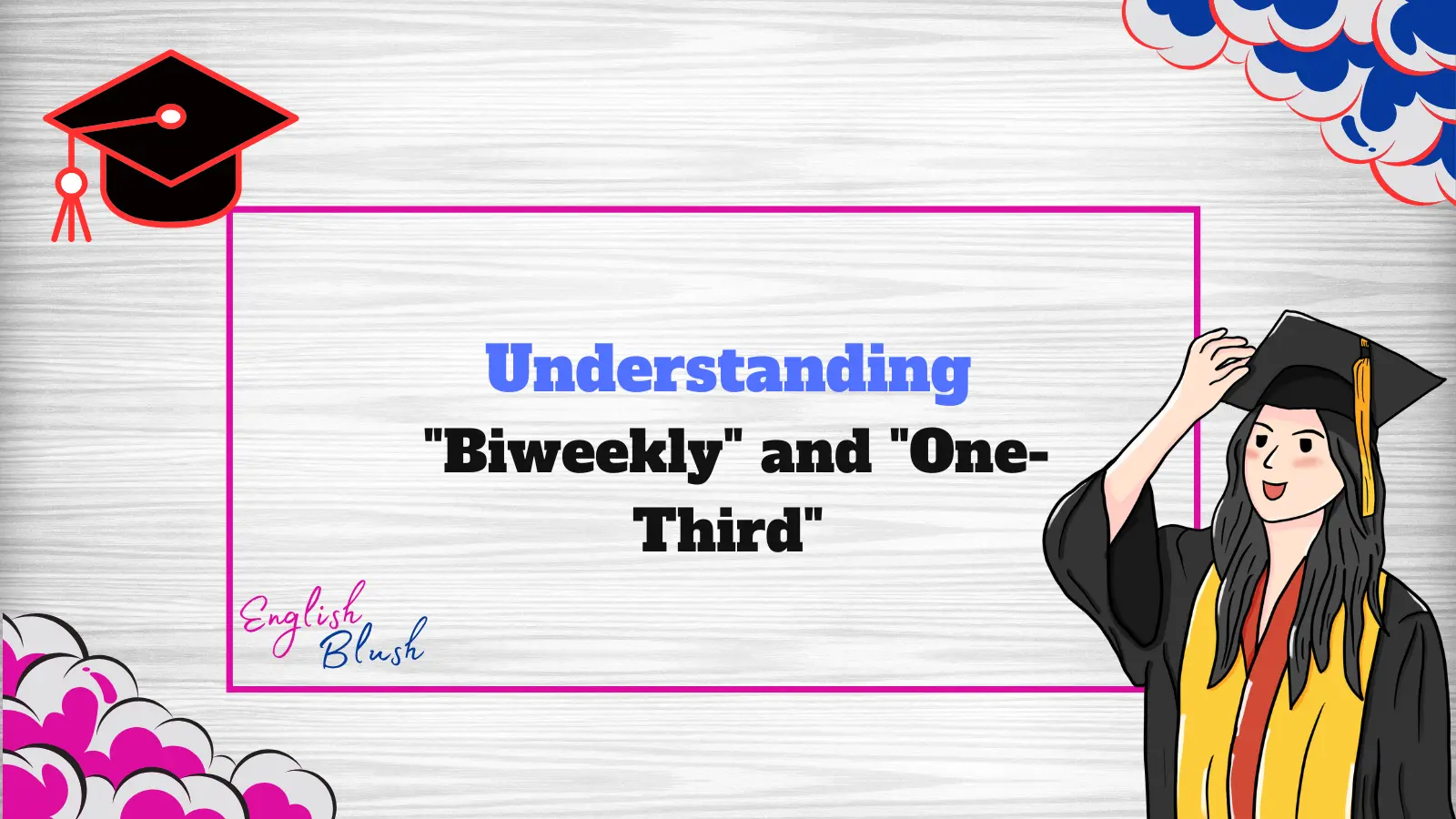Let’s dive into the nuances of the word biweekly and explore how its forms differ as a noun, adjective, and verb. Additionally, we’ll break down the proper usage of one-third, noting its roles in grammar and spelling.
1. Biweekly or Bi-Weekly?
The word biweekly can confuse some because it has two meanings:
- Occurring every two weeks.
- Occurring twice a week.
Both definitions are correct, though it’s essential to provide context so readers or listeners can understand.
When biweekly is written as bi-weekly (with a hyphen), it remains correct, though the hyphenated form is less common in modern usage.
Examples of biweekly Usage:
Noun (Correct and Incorrect):
- Correct: “The office sends a biweekly newsletter.”
- Incorrect: “We get updates on a bi weekly basis.” (Spacing error)
- Correct: “A biweekly can sometimes mean twice a week, depending on the context.”
- Incorrect: “A bi-weekly lacks a clear definition for everyone.” (Misleading usage without clarification.)
Adjective (Correct and Incorrect):
- Correct: “Our biweekly meetings help us stay organized.”
- Incorrect: “She attends a bi-weekly workout session twice a week.” (Needs clarity—it could mean every two weeks or twice weekly.)
- Correct: “The publication has a biweekly release schedule.”
- Incorrect: “This report is printed on a bi weekly plan.” (Spacing makes it grammatically incorrect.)
Verb (Correct and Incorrect): (Used less frequently this way but possible in creative forms.)
- Correct: “We need to biweekly our content schedule to stay consistent.”
- Incorrect: “The editors bi weekly new editions to match trends.” (Spacing is wrong.)
- Correct: “Could you biweekly this task with reminders every other Thursday?”
- Incorrect: “They bi weekly updates with little regularity.” (Fails grammatically.)
2. One-Third vs. One Third vs. One Third
The phrase one-third indicates a fraction of something and is most commonly used as a noun or an adjective. Let’s analyze its distinctions:
When to Use One-Third
- One-third is correct when used as a fraction. It is spelled with a hyphen when describing or modifying a noun (e.g., a one-third portion).
- In mathematical or fractional contexts, no hyphen is needed (e.g., 1/3).
- *One Third * (with a space after) is incorrect because it creates a grammatical error.
Examples of One-Third Usage:
Noun (Correct and Incorrect):
- Correct: “One-third of the cake was eaten by the children.”
- Incorrect: “Only one third of the report was ready.” (Missing the hyphen makes this less clear.)
- Correct: “One-third of the funds will be allocated to the project.”
- Incorrect: “She gave *one third * of her profits to charity.” (Incorrect spacing.)
Adjective (Correct and Incorrect):
- Correct: “He received a one-third share of the inheritance.”
- Incorrect: “A one third divide was made among the participants.” (Hyphen is missing.)
- Correct: “The cake was cut into one-third slices to share fairly.”
- Incorrect: “They calculated the savings from a one third discount.” (Improper punctuation affects clarity.)
Verb Phrase (Correct and Incorrect):
- Correct: “You must one-third the measurement before mixing the ingredients.”
- Incorrect: “We had to one third the total expenses.” (Improper formatting creates ambiguity.)
- Correct: “Can you one-third this list and send me my portion?”
- Incorrect: “They decided to *one third * the tasks for equal distribution.” (Spacing error.)
Importance of Grammar Rules
Proper grammar clarifies writing. Incorrect usage, such as adding unnecessary spaces or forgetting punctuation, can confuse readers. Following these rules allows your audience to easily understand your message without guessing your intention.
Biweekly’s Impact:
- Avoid confusion between twice a week and every two weeks.
- Adding details (e.g., biweekly on Mondays and Thursdays) prevents misinterpretation.
One-Third’s Role:
- Use a hyphen in adjectival phrases (one-third slice).
- Avoid careless spacing (*one third *).
3. Consistency Between UK and US English
In both British and American English, the rules for biweekly and one-third remain consistent. Spelling differences between UK and US (e.g., colour vs. color) do not affect these terms.
Key Points:
- Use biweekly or bi-weekly depending on preference but ensure context explains meaning.
- One-third with a hyphen is standard for adjectives and noun phrases, while *one third * is grammatically incorrect.
Conclusion
Mastering biweekly and one-third helps maintain clarity in writing. Always use hyphens properly to ensure your audience understands the intended meaning, and avoid spacing errors that hinder communication. Consistent grammar usage, regardless of regional spelling variations, strengthens the readability and professionalism of your work.





